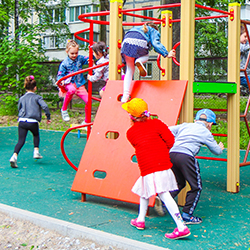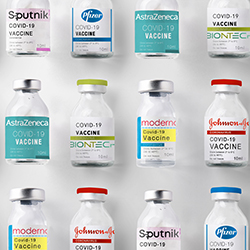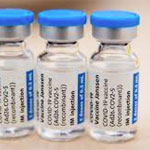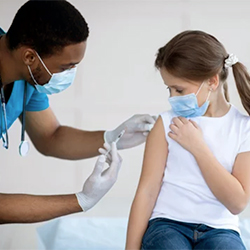By Marie Rosenthal, MS
After a lengthy discussion, the FDA’s Vaccines and Related Biological Products Advisory Committee (VRBPAC) voted 17 to 0, to recommend the Pfizer-BioNTech COVID-19 vaccine for children 5 to 11 years of age. One member abstained.

The companies presented data from a phase 2/3 randomized controlled trial that included about 4,500 children 5 to 11 years of age (2,268 from the original group and 2,379 from the supplemental safety group). The participants received two 10mcg doses administered 21 days apart. This dose is one-third of the 30-mcg dose used for people 12 years and older.
The lower dose was used in the trial to improve safety and tolerability and still achieve an immune response, company representatives said. The trial showed a vaccine efficacy rate of 90.7% in participants without prior SARS-CoV-2 infection, measured from seven days after the second dose.
No serious safety concerns related to the vaccine were identified, they said.
The committee also reviewed data from Finona Havers, MD, the medical officer, at the CDC’s National Center for Immunization and Respiratory Diseases (NCIRD), about the effects of COVID-19 in children.
Although children are less likely than adults to be infected with SARS-CoV-2, infections do occur and they are increasing, she said. “Children 5 to 11 years are making up a greater proportion of total cases: 10.6% of cases the week of Oct. 10, 2021,” she said.
In addition, these infections are not necessarily benign, Dr. Havers added. Although the numbers are much lower in children than adults, children are being hospitalized, they are ending up in the ICU, they are requiring mechanical ventilation, and some are dying.
To date there have been more than 8,300 hospitalizations among children ages 5 to 11 years old. Ninety-four children between 5 and 11 years old have died from COVID-19, which is 1.7% of all deaths among children in this age group. (Among all children, COVID-19 is one of the top 10 causes of death in the United States, according to the CDC.)
In addition, children are experiencing long-haul COVID-19 symptoms, and more than 5,000 children have been diagnosed with multisystem inflammatory syndrome in children (MIS-C), a severe hyperinflammatory syndrome occurring about two to six weeks after acute infection—60% to 70% of these children are admitted to the ICU, and 1% to 2% die, she explained.
Just as seen in adults, most of the children developing severe effects of COVID-19 have underlying conditions, primarily chronic lung disease and obesity, but they have a range of other conditions, too. COVID-19 also disproportionately affects minority children, just as it does in adults.
Another consideration, Dr. Havers said, is children can and do transmit the virus to others.
As in other decisions, the committee was very focused on safety, especially the potential for myocarditis/pericarditis seen in older children and young adults who received the messenger RNA vaccine (mRNA), but the safety data were limited, they said.
“I think the likelihood that this vaccine is going to be effective is pretty likely in the 6- to 11-year-old age group,” said Cody H. Meissner, MD, an infectious disease pediatrician at Tufts Medical Center, in Boston. “The issue is the side effects or adverse events than might be occurring after this vaccine, and I’m torn. On the one hand, we know that many parents are eager to administer this vaccine because they are so frightened … on the other hand, I think we saw that approximately 68% of the children who are hospitalized with COVID-19 have an underlying comorbidity, so that means about 32% do not.” A very small number of otherwise healthy children in this age group “might derive benefit” from vaccination, he said.
“My thought is that this vaccine should be available for those parents who are eager to get it for their child, because their child has a comorbidity or they are concerned themselves,” Dr. Meissner said.
But he is worried that if vaccination is recommended for all children, states will mandate it for school entry. “I do not agree with that,” he added.

“We are all concerned about the myocarditis issue,” said Mark Sawyer, MD, FAAP, an infectious disease pediatrician at the University of California, San Diego, although he admitted that it is probably less of a concern in this age group than at older ages. “I do think we need it as a tool in our armamentarium for high-risk children, for equity issues, for parents who really would like to protect their children and because of the long-term, very profound implications of schools being disrupted, and the social and educational impact that it is having on our children.”
Paul Offit, an infectious disease pediatrician at the Children’s Hospital of Philadelphia, said this was a “nerve-wracking” decision to make “for millions of children based on studies of only a few thousand children.”
He added that one can never know everything about a vaccine before approving it. “The question becomes when do you know enough. And I think we certainly know that there are many children between 5 and 11 years of age who are susceptible to this disease, who could very well be severe or hospitalized or die from it.”
Capt. Amanda Cohen, MD, the chief medical officer at the CDC’s National Center for Immunizations and Respiratory Diseases, who is also a voting member of VRBPAC, summed it up this way: “I think part of the problem is that we’re now talking about children, and when we are talking about children, we both don’t expect deaths and severe outcomes in the same way, then maybe we accept [them] to some degree in an older age group, but we don’t accept risks,” she said.
Dr. Cohen reiterated something that Peter W. Marks, MD, PhD, the director of the FDA’s Center for Biologics Evaluation and Research, said earlier in the day. “We vaccinate routinely against several vaccine-preventable diseases for which there are far fewer deaths and hospitalizations and ICU admissions.”
Dr. Cohen said that to her, the benefits clearly outweigh the risks. “We don’t want children to be dying of COVID, even if it is far fewer children than adults, and we don’t want them in the ICU.”
The FDA is expected to make its decision soon. If authorized, the CDC’s Advisory Committee on Immunization Practices will meet to recommend how the vaccine should be implemented in this young age group.




